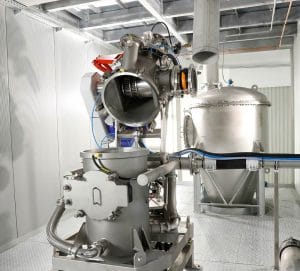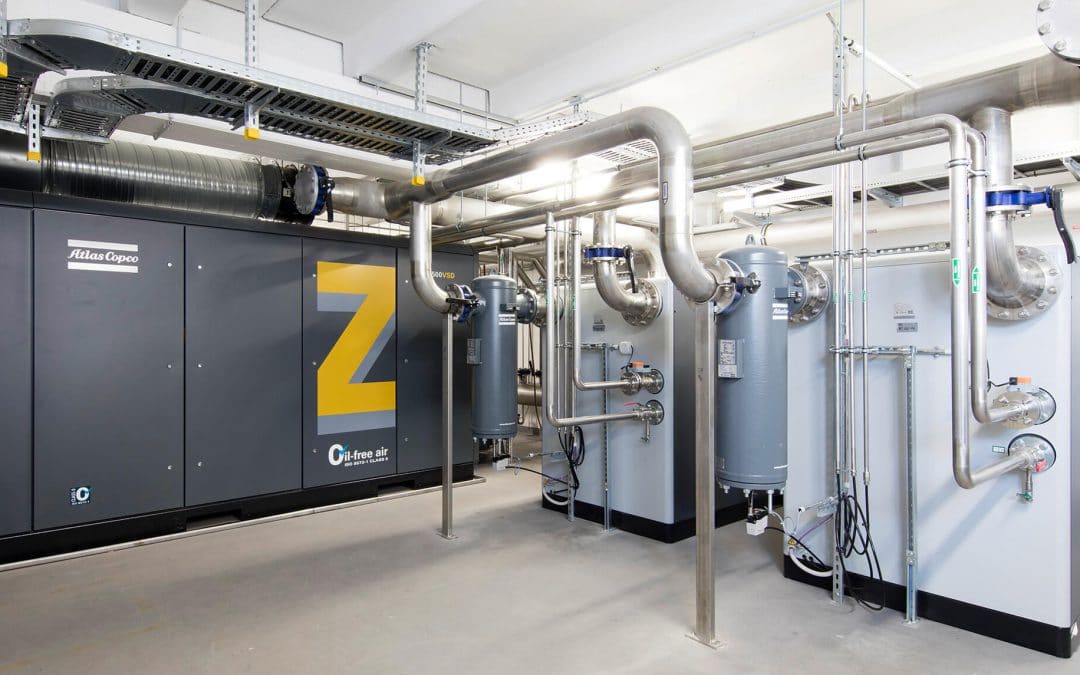Hosokawa Micron Powders changes over to completely oil-free air compressors
With grinding processes, the purity of the air used is of crucial importance for the quality of the end product.
In terms of compressed air quality and malfunction prevention, it is especially in the case of jet milling – where high volumes of air come into intensive contact with the extremely fine product – that compromises cannot be made at all.
To our minds, this is not achieved to an adequate extent if oil-lubricated compressors are used. The oil in the compressed air, which needs to be filtered out of the air in a multi-stage filter along with dust and moisture, harbours a risk in itself. Even if highly efficient systems for conditioning the compressed air produced with oil-lubricated compressors are available and initially, would appear to make the production of oil-free compressed air possible, quality problems caused by contamination with oil cannot be reliably and completely ruled out.
In view of this, and during the course of a plant expansion under consideration of all processes, systems and structures, Hosokawa Micron Powders not only invested in the construction of a new hall, but also installed a number of air jet mills in combination with oil-free compressed air.
The objective here is to produce a qualitatively high-grade compressed air that is definitively oil-free and pure, and to guarantee oil-free product processing.
According to the state of the art, the compressed air used to manufacture pharmaceutical products must not contain more than max. 0.01 mg/m3 of oil in the form of droplets or mist. Let us assume that with a suitable compressed air conditioner, it is possible to achieve a value of 0.005 mg/m3.
The compressors at Hosokawa Micron Powders produce up to 14,000 m3 of compressed air per hour. If the compressed air were to have the oil content indicated above, then oil to the tune of 70 mg/h would enter the compressed air network. This would result in an oil quantity of about 300 g per year which accumulates in the compressed air line or comes into direct contact with the product. Over the years, and dependent on the pipe layout, a considerable amount of oil can accumulate in the compressed air system which once a critical value is exceeded, can be abruptly released and thus contaminate a large amount of product.
Another risk when using oil-lubricated compressors lies in the release of huge amounts of oil in the event of a technical defect or unprofessional maintenance of the oil separator. Quite apart from the product being contaminated, a prolonged system standstill must be expected due to the requisite cleaning work.
This contamination risk for your product is non-existent if oil-free air compressors are used, because where there is no oil then naturally no oil can be released.
In this way, Hosokawa Micron Powders is able produce a qualitatively high-grade compressed air that is definitively oil-free and pure, and can guarantee oil-free product processing. If our aim is the responsible handling of our customers’ products, then this makes the use of oil-free air compressors mandatory for us.

Extra bonus: high level of efficiency and heat recovery reduce the CO2 emission by 60%
The cutting-edge compressors have an extremely high efficiency factor and thus an extremely low power consumption.
Over and above this, the water-cooled compressors were equipped with an additional heat recovery system which ensures efficient use of the waste heat generated during compression.
A heat exchanger installed in the compressor absorbs a great deal of the heat generated in the form of heated water and feeds it into the main water circuit of our heating system for the production hall and the office. In addition, the service water for the showers is heated.
This measure has made it possible to realise a significant reduction of the heating oil requirement by more than 60% and thus also of the CO2 emission.
With fulfilment of future customer requirements in mind, the available waste heat will also make it possible to offer inexpensive and environmentally compatible drying processes.

